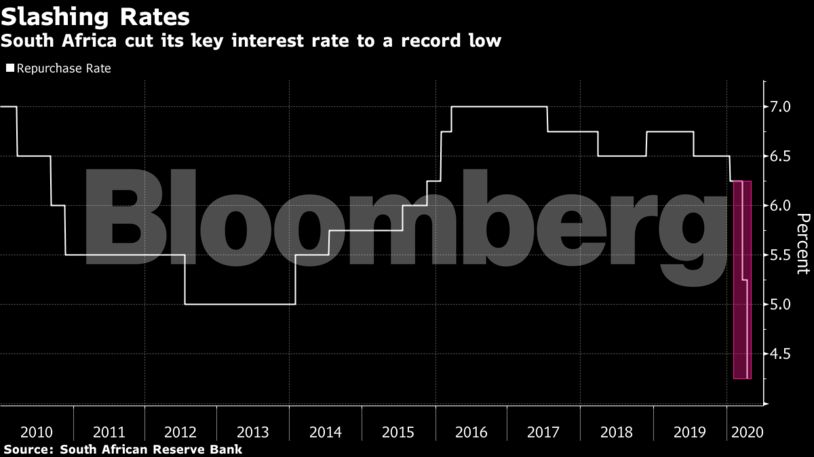The Reserve Bank said in a statement on Tuesday 14 April that it had moved its May Monetary Policy Committee (MPC) forward to take the decision to cut its repo rate by another 100 basis points.
The move comes as a surprise but is hardly shocking given the extended lockdown to contain the Covid-19 pandemic and the mounting toll it, and unfolding global events, are taking on South Africa’s economy. It brings the prime lending rate for consumers to 7.75% and follows a 100 basis point cut at the bank’s March MPC meeting. The cut means interest rates are at their lowest in South African history. The previous low was 5% in 2013.

History is being made on other fronts as well. And what a difference three weeks makes in these turbulent times.
“Lots of things have changed since the March meeting,” Governor Lesetja Kganyago said during an online conference with journalists and other members of the MPC.
Just three weeks ago the SARB saw a 2020 contraction of 0.2% — a forecast that even at the time looked wildly optimistic. SARB staff spend the long Easter weekend crunching data, giving rise to the new gloomy, but far more realistic, outlook.
“The Covid-19 outbreak will have a major health and social impact, and forecasting domestic economic activity presents unprecedented uncertainty. With that in mind, the Bank expects GDP in 2020 to contract by 6.1%, compared to the -0.2% expected just three weeks ago. GDP is expected to grow by 2.2% in 2021 and by 2.7% in 2022,” the MPC statement said.
Mike Schussler, an economist at economists.co.za, said that a 6.1% shrinkage would be the biggest fall in South African output since the Great Depression in the 1930s, underscoring the scale of the challenge that policymakers are confronting. And given how anaemic growth has been in recent years, it will likely mean the economy will end 2020 around the size it was four or five years ago — a major setback that will make the “lost Zuma years” look almost like a lost golden age. That’s how bad things are at the moment.
The Reserve Bank is clearly concerned about the growth of bad loans and debt for households and companies that have lost income and revenue streams to the lockdown, compromising their ability to make timely repayments. Central banks around the world have been slashing rates in a bid to get more money circulating through economies undergoing unprecedented stress.
“Economic contractions are expected to be deepest in the second quarter of 2020, with some recovery expected in the third quarter of the year. The strength of the recovery into the fourth quarter and 2021 will depend on how quickly countries are able to open up for economic activity safely, requiring sustainable social distancing rules, safety processes put in place by businesses and public institutions, and capacity of hospitals to accommodate those in need,” the MPC statement said.
The current quarter is when the economy is really expected to tank, which is hardly surprising as the economy is on lockdown at least for the first month of the period, with some notable exceptions such as the mining industry which is in a slow process of rebooting.
Consumer inflation in February sped up to 4.6% from 4.5% in January, but inflation is hardly a concern in an economy that is in the throes of a depression-sized contraction with unemployment set to soar from its already shocking levels. Compared to the prime rate, interest rates are not yet negative and both inflation and rates could come down further.
“The Bank’s headline consumer price inflation forecast averages 3.6% for 2020… The overall risks to the inflation outlook at this time appear to be to the downside,” the SARB noted. This gives the bank space for further cuts.
Oil prices are depressed, but further rand weakness could stoke inflation. The rand on Tuesday had lost more than 1% to the Euro to climb to over 20/Euro, while it was fetching around 18.27 to the dollar, according to data on sharenet.co.za.
“Credit risk has risen back to 2008 levels and about R100-billion of local assets have been sold by non-resident investors,” the SARB said. It did not immediately give a timeline on that sale of local assets, but a big forex outflow is one of many trends that make the currency vulnerable.
“The rand has depreciated by 22.6% against the USD since January and by 17.3% since the March meeting of the MPC,” the SARB said. So the pace at which the currency is losing ground is picking up fast.
The SARB, like some other branches of government — not to mention business and wider civil society — is certainly being proactive.
Mines and Energy Minister Gwede Mantashe’s efforts to get parts of the mining sector back up and running in as safe a manner as possible also fall into this category. An unprecedented crisis calls for unprecedented action and competent hands on the tiller. In that regard, the Zuma years look anything but golden. BM



















 Become an Insider
Become an Insider